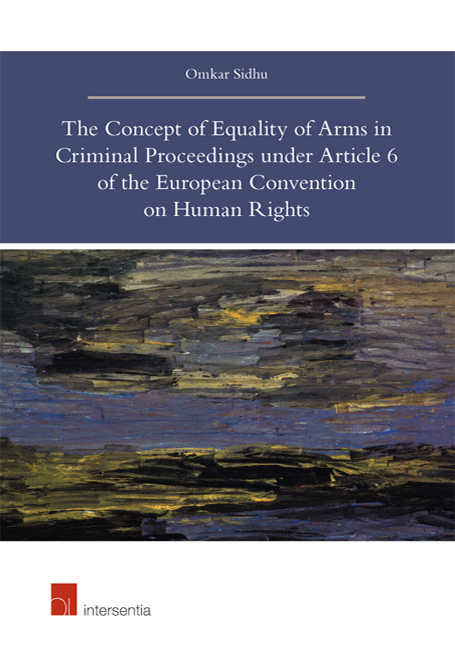Book contents
- Frontmatter
- Contents
- Introduction
- Chapter 1 A Background for Article 6
- Chapter 2 Equality of Arms
- Chapter 3 Equality of Arms and the Right to Challenge and Call Witness Evidence
- Chapter 4 Equality of Arms and the Right to Adequate Time and Facilities
- Chapter 5 Equality of Arms and the Right to Legal Assistance
- Concluding Overview
- Bibliography
- List of Cases
- List of Legislative Instruments
Chapter 1 - A Background for Article 6
Published online by Cambridge University Press: 19 September 2018
- Frontmatter
- Contents
- Introduction
- Chapter 1 A Background for Article 6
- Chapter 2 Equality of Arms
- Chapter 3 Equality of Arms and the Right to Challenge and Call Witness Evidence
- Chapter 4 Equality of Arms and the Right to Adequate Time and Facilities
- Chapter 5 Equality of Arms and the Right to Legal Assistance
- Concluding Overview
- Bibliography
- List of Cases
- List of Legislative Instruments
Summary
INTRODUCTION
Procedural rights of individuals subjected to judicial proceedings act as a restraint on the arbitrary and oppressive assertion of power by state authorities. This restraint is especially critical in criminal proceedings where life or liberty is at stake, thus ‘[t]he history of liberty has largely been the history of observance of procedural safeguards.’ The procedural rights of the accused, and his capacity to exercise them, reflect the content and standard of procedural fairness available in the particular society in which the criminal proceedings occur. The content and standard of this fairness is grounded in reason, experience and the socio-cultural environment and expectations prevailing within that society in the historical time-period of those proceedings. Accordingly, as the level of civilisation in a society develops through history, procedural rights securing this fairness exhibit an evolution: ‘Fairness is a constantly evolving concept. … [S]tandards and perceptions of fairness may change, not only from one century to another but also, sometimes, from one decade to another.’ this progressive evolution, albeit interrupted by periods of regression, reveals the emergence and recurrence of certain trial rights, in various forms, which have been developed or adopted by legal systems through history as a useful or essential means to a just and fair adjudication.
This chapter charts this historical evolution in standards of procedural fairness, identifying certain influential developments in the trial rights of accused persons, to establish a background for Article 6 before its inception. The Article 6 catalogue of rights was not devised in a vacuum, but was informed by the past. Certain basic safeguards for the accused, resembling to a degree those included in Article 6, emerged and endured through different stages of procedural history because of their contribution to juridical activity perceived at the time as well-founded and fair. These procedural safeguards included, for example, witnesses being called and challenged, the provision of some disclosure and the allowance of legal representation, all of which are also discussed in the modern context of Articles 6(3)(b)–(d) and equality of arms in Chapters 3–5. The presence of such safeguards is indicative of historical attempts to avert some of the disadvantage between the prosecution or accuser and the accused. It is through these attempts increasingly being made in history that procedural equality would eventually become an aspiration for judicial proceedings purporting to be rational and fair.
- Type
- Chapter
- Information
- The Concept of Equality of Arms in Criminal Proceedings under Article 6 of the European Convention on Human Rights , pp. 9 - 74Publisher: IntersentiaPrint publication year: 2017

